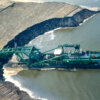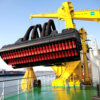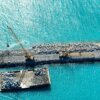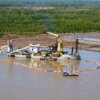Choosing the appropriate dredger is determined by soil conditions, transport options, dredging location, water depths and placement, and economics.
Soil conditions
The type of soil being dredged is a determining factor for selecting a dredger. For instance, rock that has not been pre-treated generally limits the types of dredgers to mechanical or cutterhead dredgers designed specifically for rock dredging. Where the material is sand and can be dredged effectively by several dredger types, then a more detailed consideration of operating parameters is required, such as transport options.
Transport options
Transport options affect the decision-making process and must consider the longer distances over water which might favour hoppers and barges, the longer distances over land favouring pipelines or pumping from a nearshore position, and shorter distances over water or over land.
Dredging location, water depth, placement
Trailing suction hopper dredgers are able to work efficiently in entrance channels where sea and traffic conditions make stationary plant less desirable and effective. The location of the dredged material placement areas and access to them may also play an important role in the decision on the most suitable and effective dredger type.
Economics
The final choice may need to be made on the basis of economics, ecological effects or both. All these factors require both technical and economic analysis in the decision process. For instance, the most effective dredger may not be available close to the work site and then mobilisation time and cost must be factored into the decision.
To give an approximate sense of the employment of various types of dredgers, the worldwide distribution of dredgers by type are:
- trailing hopper dredgers,
- backhoes/dipper dredgers,
- cutter-head dredgers,
- bucket dredgers,
- plain suction dredgers,
- grab/clamshell dredgers,
- dustpan dredgers,
- grab hopper dredgers,
- bucket-wheel dredgers,
- water injection/agitation dredgers,
- barge unloaders, and
- auger dredger.
In summary, there are a variety of tools or dredgers capable of being used on a project. All of the factors mentioned above will play a part in selecting the most suitable equipment for a particular job. Ultimately, however, if the work is to be accomplished by contract, the competitive bidding process will often serve as the final decision-making mechanism.

























